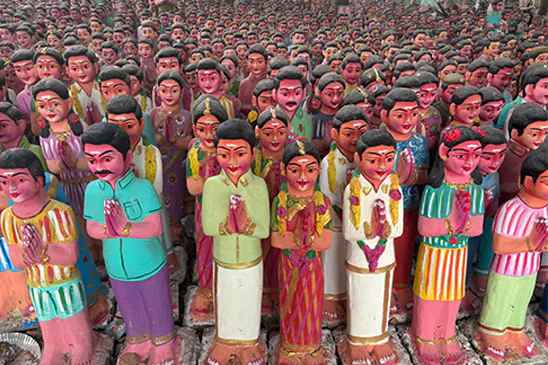1.ADMINISTRATIVE FORMALITIES
PASSPORT AND VISA
- Passport: Check that your passport is valid for at least six months after your return date.
- Visa: Most travellers need a visa to enter India. It is now possible to apply for an e-visa for tourist, business or medical stays. It is applied online via www.indianvisaonline.gov.in and can be issued between 4 and 120 days before your departure.
SPECIAL PERMITS
- Some areas such as Sikkim, Arunachal Pradesh, and the Andaman and Nicobar Islands, do require special permits to visit them.
2.HEALTH CARE ADVICE
- Vaccinations: Make sure your vaccinations are up to date, in particular those against yellow fever, hepatitis A and B, and typhoid, as well as any anti-malarial medication you may have to take before your departure (please do check with your general practioner regarding this).
- Health insurance: Insurance covering medical and hospitalisation expenses and medical repatriation is strongly recommended.
3. CURRENCY
- Currency: The currency in India is the Indian rupee (INR).
- Bank cards: You can use Visa cards in the major cities, but it's best to always carry local currency for small purchases, so plan to have some cash in Indian rupees. ATMs are also available in cities but could not be within easy reach in remote areas.
- Tip: Use services such as Revolut or Wise for payments to minimise costs.
4. INDIAN CLIMATE AND WHEN TO TRAVEL THERE
- Ideal time of year: November to March is the best time to visit India, with dry weather and pleasant temperatures.
- Rainy season: From June to October, it can rain heavily (monsoon) in some parts, such as in the Southern area, which can make some areas less accessible.
5. HOW TO REACH AND LOCAL MODE OF TRANSPORTATION
- Flights: You can arrive in other major cities such as Delhi, Mumbai, Bangalore, Chennai, Goa, etc.
- Several airlines offer flights to India: British Airways, Lufthansa, Air France, Air India, Emirates, Qatar Airways, Etihad Airlines, Oman Airways, Gulf Air, Kuwait Airways, Air Mauritius, Delta Airlines, etc.
- Trains and buses are the common means of transport.
- Auto-rickshaws and taxis are handy for short trips.
- Remember to book internal flights if you are travelling across the country. At Holidays by Easyway, we can help you find and book the right mode of transport locally.
6. ACCOMMODATION
- India offers a wide range of accommodation: guest houses, luxury hotels, boutique hotels, Ayurveda retreats, homestays, houseboats, and resorts.
7. CULTURE AND CUSTOMS
- Clothing: Respect local customs by wearing clothes that cover your shoulders and legs. You can buy traditional clothing locally.
- Greetings: The traditional greeting is namaste (hands held together vertically under the chin).
- Photographs: Always ask permission before taking photographs, especially in religious places.
- Tipping is a common practice in India, although it is not compulsory. It is customary in India to leave a tip in restaurants, for drivers, guides, porters, etc.
8. HEALTH
- Medicines: Bring a small first-aid kit with your personal medicines. India has a large number of private and public hospitals.
9.VAPING
- Vaping is prohibited: The use and possession of electronic cigarettes is not allowed in India; heavy fine and imprisonment could be handed down if found using or possessing an electronic cigarette.
10. ACTIVITIES AND EXCURSIONS
- India is full of fascinating sites, from magnificent temples and ancient palaces to colourful markets and heavenly beaches.
- You can choose to visit spiritual places such as Varanasi, discover the local cuisine (see our Indian Cuisine blog), or explore cities such as Jaipur, Agra, or Pondicherry.
- If you're feeling adventurous, you can discover less touristy areas and soak up the local culture.
11. ESSENTIAL ACCESSORIES TO HAVE
- Electrical adapter: Sockets are different in India, so bring an adapter for your electronic devices.
- Water bottle and external battery: To stay hydrated and connected, especially when travelling in remote areas. You can get a SIM card in India from Airtel, Vodafone, or Jio
12. HOLIDAYS CALENDAR
- Tamil New Year: April
- Pongal (harvest festival in Tamil Nadu): January
- Onam (harvest festival in Kerala): August
- Holi, festival of colours: March
- Dusserah, festival of the gods: September-October
- Vinayaka Chaturthi, the festival of Ganesh: September
- Diwali, festival of lights: October-November
Related Posts

July 4, 2025
There is no better way to discover India than through the exploration of its multi-faceted exquisitely scented cuisine. The Indian...

July 4, 2025
La Villa Pondichéry ( Luxury Boutique Hotel ) La Villa Pondichéry is a 19th-century colonial residence located in the historic...
